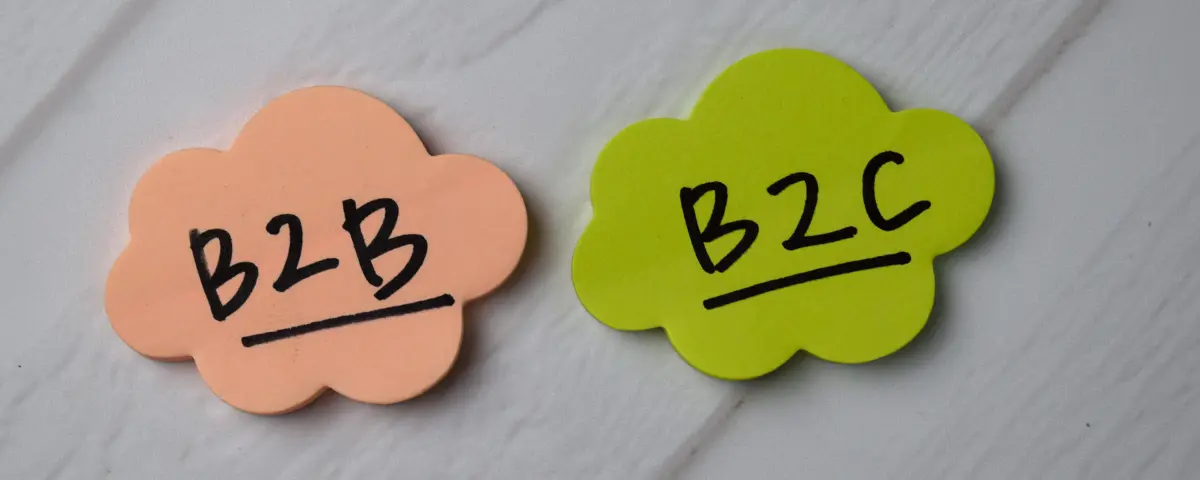B2B marketing is a crucial aspect of the business world, yet many people are unsure of what it entails. In simple terms, B2B marketing is the process of promoting and selling products or services to other businesses, rather than to individual consumers.
This type of marketing is essential for companies that sell to other companies, as it helps them to build relationships, generate leads, and ultimately drive sales.
In this blog post, we will explore the concept of B2B marketing in more detail, looking at its key components, strategies, and benefits.
Whether you’re a business owner, a marketer, or simply interested in learning more about this important topic, this post is for you.
This article also consists of a marketing course that you can take to learn digital marketing skills and succeed as a B2B marketer.
So let’s dive in and discover what B2B marketing is all about!
What is B2B?
B2B commonly known as (business-to-business) refers to transactions of products, services or information between businesses, rather than between a business and individual consumers.
B2B transactions often involve larger volumes or more specialized and complex products/services than B2C transactions. The buying process is also usually more formal, with factors like existing business relationships, negotiations and contracts playing a bigger role compared to consumer purchases.
Examples of B2B transactions include a marketing agency working with a business to promote their products or services, a software company providing services to a business or an advertising agency creating marketing campaigns for other companies.
What is B2B Marketing?

Get 50% Discount to Master ALL Aspects of Digital Marketing That Can Earn You $2,500 - $5,000 a month (Even if you are a complete beginner!)
Our students that intentionally implement what they learn from our digital marketing course make back the entire course fee within a single month or more after completing our course because our course gives them many income generating options with unlimited earning potential with no age or location barrier. The best part is no technical skills are required.
An opportunity to change your lifestyle and make money working from anywhere in the world. The results our students get from our digital marketing course prove this could be applied to any market or country and that it is designed for any skill level and work background.
*By signing up, you agree to our privacy policy and terms of service.
B2B (Business-to-Business) marketing refers to the marketing of products or services to other businesses or organizations. This type of marketing uses strategies, tactics, and content tailored specifically for businesses and organizations, rather than consumers. The goal is to generate quality leads and nurture them into loyal business customers.
Importance of B2B Marketing
B2B marketing is crucial for selling goods and services to businesses, which often involves navigating a complex decision-making process involving multiple stakeholders. The importance of B2B marketing lies in its ability to build successful, long-lasting relationships between businesses.
Some of the important of B2B marketing are
- It ensures alignment between sales and marketing efforts, leading to more effective lead generation and nurturing.
- It focuses on creating personalized content that resonates with businesses, showcasing how products or services address their needs.
- It helps in building successful relationships with other companies and drives business growth.
- Finally, Consistent and effective B2B marketing efforts can enhance a company’s brand reputation within its industry.
B2B vs B2C Marketing

| B2B Marketing | B2C Marketing | |
| Target Audience | It consists of other businesses, professionals, and decision-makers within organizations. | Individual consumers or end-users. |
| Decision-Making Process | It is longer and more complex, involving multiple organisational stakeholders and decision-makers. | It is shorter and more straightforward, often driven by individual preferences and emotions. |
| Purchase Motivation | Purchases are primarily driven by factors such as return on investment (ROI), cost savings, efficiency, and solving business problems. | Personal preferences, emotions, brand loyalty, and perceived value often influence purchases. |
| Price | Pricing is often negotiated and based on factors like volume, service level agreements, and long-term contracts. | Pricing is typically fixed and lower, catering to individual consumers’ budgets and perceived value. |
| Sales Cycle | The sales cycle is generally longer, involving multiple touchpoints, negotiations, and demonstrations. | The sales cycle is typically shorter, with a more direct path from awareness to purchase. |
| Marketing Channels | Channels include trade shows, industry events, email marketing, content marketing, and account-based marketing. | Channels often involve mass media advertising, social media, influencer marketing, and e-commerce platforms. |
If you want to learn about the difference between B2B vs B2C Marketing, why not attend our next digital marketing training to understand the fundamentals of online marketing.
B2B Marketing Process
The B2B marketing process typically follows a structured approach to reach, engage, and convert potential business customers effectively. The stages of the B2B marketing process are:
1. Awareness Stage
Generating initial interest and brand awareness among the target audience through tactics like content marketing, social media, and advertising.
2. Consideration Stage
Nurturing leads by providing more detailed information, addressing pain points, and positioning your solution as the best option.
3. Decision Stage
Actively engaging with prospects, addressing objections, and guiding them through the purchasing process to close the deal.
4. Retention Stage
Focusing on customer satisfaction, building relationships, and offering additional products/services to retain and expand existing accounts.
B2B Marketing Strategies
The B2B marketing strategies highlighted in the provided sources include various tactics tailored for marketing products or services to other businesses or organizations.
Understand Your B2B Buyer’s Journey
In B2B marketing, it’s crucial to understand the decision-making process that businesses go through when purchasing your products or services. The buyer’s journey typically involves multiple stakeholders, longer sales cycles, and a more extensive evaluation process compared to B2C (Business-to-Consumer) marketing.
You will need to map out the different stages of the buyer’s journey, such as awareness, consideration, and decision, you can tailor your marketing efforts to address the specific needs and pain points of your target audience at each stage.
Identify Your Target Market And Target Audience
This involves identifying the industries, company sizes, job roles, and decision-makers that are most relevant to your offering.
You should conduct market research to have deep information about your target audience. Some details may include “Age, Location, Gender, level, Job title, Behaviors, Habits”.
This information will help you create buyer personas and customer avatars, that will help you to understand how they make purchase decisions and which marketing channels they’re more likely to use.
Decide On Your Goals
Set clear and measurable goals for your B2B marketing strategies so you can check your performance at the end of the campaign.
These goals could include generating leads, increasing brand awareness, driving website traffic, improving customer retention, or boosting sales revenue. The goals to measure will determine the campaign objective of the company.
When you align your marketing efforts with specific goals, it will help you measure the effectiveness of your strategies and make data-driven decisions.
Select Your Marketing Channels
B2B marketing often involves a multi-channel approach to reach and engage your target audience effectively.
Common channels include content marketing (e.g., whitepapers, case studies, webinars), email marketing, search engine optimization (SEO), social media marketing (with a focus on platforms like LinkedIn), account-based marketing (ABM), event marketing (trade shows, conferences), and strategic partnerships or referrals.
By combining all these marketing mix to reach your target audience, the company will be able to cover every platform that has its target audience to promote their services.
Create a B2B Marketing Plan
For a B2B marketing strategy to work, you need to develop a comprehensive B2B marketing plan, this plan should outline your strategies, tactics, channels, budget allocation, and timelines for the campaign.
This marketing plan should align with your overall business objectives and be reviewed and adjusted regularly based on performance data and market reaction.
When you review and adjust your plan regularly, you will cover different aspects of your marketing plan easily.
Create Content
Content creation plays a crucial role in B2B marketing strategies. you have to develop high-quality at regular intervals, informative, and valuable content that addresses the pain points and challenges of the target audience at each of their buyer journey.
This will allow you to send the right message to the target audience and let them know you are with them on this journey.
This content can take various forms, such as blog posts, whitepapers, case studies, videos, infographics, and webinars depending on the stage and level of the audience. This can position your company as a thought leader and help you build trust with potential customers.
Define marketing KPIs (Key Performance Indicators)
Establish clear KPIs to measure the success of your B2B marketing strategies.
These KPIs may include lead generation metrics (e.g., number of leads, lead quality, conversion rates), engagement metrics (e.g., website traffic, social media interactions, email open rates), and revenue metrics (e.g., sales revenue, customer lifetime value).
Knowing the KPIs to measure, allow you to determine the effectiveness of your marketing campaigns.
The data collected from the campaign will allow you to make informed decisions and provide useful insights into the success of your campaigns.
Therefore it is advised to regularly track and analyze these KPIs to optimize your strategies and allocation of resources.
Types of B2B Marketing Channels
B2B (Business-to-Business) marketing can be categorized into several types based on the target audience, marketing approach, or specific tactics employed. Here are some common types of B2B marketing:
B2B Content Marketing
Content marketing is an important component of B2B marketing strategies. It revolves around the creation and distribution of high-quality content, relevant, and consistent content that addresses the specific needs, challenges, and interests of a well-defined target audience. The primary objective is to attract and engage potential customers by positioning the company as a thought leader and subject matter expert within the industry.
Successful content marketing in the B2B space involves leveraging a diverse range of content formats, including
- Informative blog posts,
- In-depth case studies,
- Comprehensive whitepapers,
- Videos
- Podcasts
When you consistently deliver valuable and educational content tailored to the various stages of the buyer’s journey, B2B companies can build trust, nurture relationships, and ultimately drive conversions and sales.
The key is to create content that resonates with the target audience, providing them with actionable insights and solutions to their business problems.
B2B Digital Marketing
Digital marketing is important in promoting your business and connecting with a target audience.
B2B digital marketing is a critical strategy for businesses seeking to reach and engage with other businesses or organizations. With the increasing reliance on digital channels.
B2B marketers need to adapt their strategies to meet the changing needs and preferences of their target audiences.
B2B digital marketing encompasses various tactics, including social media marketing, email marketing, content marketing, account-based marketing, influencer marketing, search engine optimization, and nurturing campaigns.
When you utilize these strategies, B2B businesses can build brand awareness, establish thought leadership, and foster long-lasting relationships with their target audiences.
B2B digital marketing also enables businesses to leverage data and analytics to measure and optimize their marketing efforts, ensuring a more efficient and effective use of resources to drive growth and success.
Account-Based Marketing (ABM)
This is a highly targeted and personalized approach to B2B marketing that concentrates sales and marketing efforts on a carefully selected group of high-value target accounts or companies.
Unlike traditional broad-based marketing strategies, ABM involves identifying and prioritizing the most promising accounts based on factors such as industry, company size, revenue potential, and strategic fit.
Once the target accounts are identified, ABM employs personalized campaigns and messaging tailored specifically to the unique needs, challenges, and decision-makers within those organizations.
This level of personalization often requires in-depth research, account profiling, and close collaboration between marketing and sales teams. By focusing resources on these high-value accounts, ABM aims to drive deeper engagement, accelerate the sales cycle, and maximize the potential for long-term, mutually beneficial relationships.
Event Marketing
Event Marketing allows companies to engage with their target audience and establish meaningful connections. It involves hosting and participating in industry events, trade shows, conferences, and seminars as an exhibitor, sponsor, or speaker.
These events provide a unique opportunity to showcase products or services, generate leads, network with potential customers and partners, and reinforce brand awareness within the industry. it allows you to take direct questions from as many prospects as possible and provide answers that will make it easy for them to make decisions.
Effective event marketing requires careful planning and execution, including selecting the right events that align with the company’s target market, creating an engaging and memorable presence through booth design and interactive experiences, and leveraging pre-event and post-event marketing efforts to maximize ROI.
When you host an event to get closer to your target audience, it can help your B2B companies build trust, establish thought leadership, and cultivate long-lasting relationships with key decision-makers and influencers in their respective industries.
B2B Email Marketing
Email marketing provides a direct and cost-effective channel to reach and engage with potential and existing customers. In the B2B, email marketing campaigns can take various forms, including newsletters, product updates, promotional offers, and targeted nurturing sequences.
In B2B email marketing, it usually involves a strategic approach, like segmenting the audience based on factors such as industry, job roles, and buyer personas.
You have to personalise and send relevant content tailored to the specific needs and interests of each segment to capture their attention and drive engagement.
When executed correctly, email marketing can nurture leads, build relationships, and drive conversions by delivering valuable information, addressing pain points, and guiding prospects through the buyer’s journey.
B2B Social Media Marketing
It involves leveraging social media platforms to connect with potential customers, build brand awareness, and establish thought leadership within the business-to-business space. Platforms like LinkedIn, Twitter, and industry-specific forums are commonly utilized but the choice of channels depends on where the target audience is most active and engaged.
B2B social media marketing strategies often revolve around creating and sharing valuable, informative content that addresses the pain points and challenges faced by the target audience. This could include industry insights, expert opinions, case studies, and educational resources.
Additionally, social media provides an opportunity for direct engagement, enabling B2B companies to participate in relevant conversations, answer queries, and foster relationships with potential customers and industry influencers.
Social media marketing also allows for targeted advertising ensuring that the right messaging reaches the desired decision-makers and stakeholders within specific organizations or industries.
Therefore, your aim should be to deliver value and maintain an active presence on relevant platforms to enhance online visibility, generate leads, and position themselves as trusted authorities in their respective fields.
B2B Marketing Tred 2024
Based on the information provided in the sources, the top B2B marketing trends for 2024 include:
Video Marketing
Video marketing is a crucial aspect of B2B marketing trends in 2024, with various emerging trends that businesses can leverage to engage their target audience.
One of the most significant trends is the rise of short-form video, which aligns with the increasing use of smartphones for browsing and watching videos.
Businesses should create and optimize their video content for mobile users, who make up the majority of web traffic, video plays, and social media visits.
In addition, the use of videos as a tool for handling customer service and improving CX is expected to grow. Videos personalized for the viewer are particularly well-suited to this purpose since the information included is specific to adding a human touch to the customer experience.
Integration of AI and Automation
The integration of AI and automation tools is increasingly being used for planning and producing content.
AI can help B2B marketers create more engaging and personalized content by analyzing customer data and identifying patterns and trends.
This, in turn, can lead to improved customer engagement, increased lead generation, and higher conversion rates.
AI can also automate repetitive tasks, such as data entry, lead routing, and scheduling meetings, freeing up time for B2B sales and marketing teams to focus on more strategic activities.
With all this integration, more B2B marketers are leveraging these technologies to improve their marketing efforts and drive business growth.
User-Generated Content
User-generated content (UGC) is a significant trend in B2B marketing for 2024, as it builds trust and authenticity with potential buyers.
According to research, 60.5% of C-suite executives and 68% of Directors/VPs need to see UGC before making a purchase decision. Websites with UGC convert 29% more, making it a valuable tool for B2B marketing strategies.
UGC can be used in various stages of the buyer’s journey, from awareness to decision-making, and can be contextually relevant to the content issue. Encouraging customers to focus on specific keywords, features, and use cases when they publish UGC can increase engagement and credibility.
Influencer Content
Influencer content is a key trend in B2B marketing for 2024, enabling businesses to partner with industry-thought leaders to enhance credibility, reach wider audiences, and drive lead generation.
Leveraging influencers helps establish authority and brand awareness, making it a valuable strategy for B2B marketers aiming to grow their brand’s reputation and customer base.
Influencers help you to reach a wider audience through the community and followers they have built through their online presence which makes it easy for them to send out messages that resonate with them to get positive feedback.
Conclusion
B2B marketing is a crucial aspect of modern business strategy, focusing on the development and sale of goods and services to other businesses. It is a complex field that requires a deep understanding of the unique challenges and opportunities presented by the B2B market. This will allow you to leverage a range of marketing techniques available, from traditional channels to digital strategies like social media and influencer marketing. This allows B2B marketers to build strong relationships with their customers, generate leads, and drive growth for their businesses. Finally, B2B marketing will remain a vital component of business strategy for years to come.
Finally, you can learn about marketing from various Digital Marketing Institutes. But I recommend Digital Marketing Skill Institute (DMSI) for a full professional marketing course.
FAQs
What is B2B field marketing?
B2B field marketing is an area in which you sell a product, distribute promotional information, and personally connect with target buyers. It can take many forms, including supporting sales, teaching a class, leading a workshop at a conference, or hosting a demo at an event. B2B field marketing is important because it ensures that you’re always present and visible to your target audience, allowing you to meet and engage with them in a meaningful way.
What is a B2B marketing example?
An example of B2B marketing is account-based marketing (ABM), a strategic approach that focuses on targeting specific high-value accounts. B2B marketers can use ABM to tailor their marketing efforts to the client’s needs, providing personalized and relevant content to engage and convert prospects into customers.
Who is the king in marketing?
According to Latin Business Today, the customer is king in marketing. This means that all marketing channels, press, events, campaigns, advertisements, and posts are positioned for and to secure the business of the customer.
More Resources
What is B2C Marketing? Definition, Benefits & Strategies
What is a Digital Marketing Campaign – Types and Strategies
What is Conversational Marketing? A Beginner’s Guide


